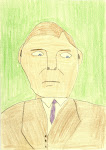Jackson was dirt poor and rarely attended the local schoolhouse. By age thirteen he'd joined the revolutionary army. Polk was terribly ill with bladder stones and didn't go to school until he was seventeen. Zachary Taylor grew up in frontier Kentucky and had to work. He was embarrassed all his life by his lousy spelling and penmanship. Millard Fillmore and Andrew Johnson worked with their folks and then became apprentices, Fillmore in a cloth factory and Johnson as a tailor. Both Fillmore and Johnson were schooled only as young adults by their wives. And then there is the example of Abraham Lincoln who, growing up in the backwoods of Indiana and Illinois, only had a few months of formal schooling throughout his life. Whatever he learned, from the classics to the law, he taught himself.
Simon's response to learning about yet another president, who as a child did not have to craft paragraphs or slog through long division, learning instead to shoot, farm, ride, hunt, sew, or fish, is always the same.
Simon's response to learning about yet another president, who as a child did not have to craft paragraphs or slog through long division, learning instead to shoot, farm, ride, hunt, sew, or fish, is always the same.
“Why do I have to do school? Forget writing—let me learn to hunt instead! Who cares about math? I'll learn how to shoot now—write later.”
He's quick to point out that he's always doing something: building Legos, making flip-books (his latest obsession) and listening to audiobooks.
“It's not like I'm super lazy, you know?”
And there is truth to that. If I'm really honest with myself, I would have to say that most of the information that Simon has thoroughly made his own, he has taught himself with a dogged persistence. I can take no credit. He listens to audiobooks of world history, replaying what he does not understand--until he does. If he's hearing about Peter the Great's siege of Azov, he takes his globe to bed and finds Azov.
I think often about these presidents not learning to read as children. We live in a culture where if a child is not mastering certain skills by a certain age, he's pronounced deficient, delayed--damaged goods. To make sure the child masters these skills at the specified time, they are reviewed and drilled year in, year out, ad nauseam. However, every home-educating parent, if brutally honest, will agree that you can teach all the math covered between 1-8 grade to a twelve year old in three months. Think of all the bears your child could have hunted, the horses he could have ridden, the wheat he could have harvested.
I'm being facetious, I know. All I'm trying to point out is that children who are not being prodded to master reading and writing skills on a strict specified schedule are not necessarily being placed in an intellectual deep-freeze. Children pursue their own interests; they yearn to be independent, to be the masters of their own lives; they make an effort to accumulate skills. Zachary Taylor, one of our greatest military leaders, became a great hunter, horseback rider and fisherman long before he reached puberty, or mastered reading. Andrew Johnson was running a business before he could write. And Abraham Lincoln, with only the most limited of formal reading instruction, read everything he could get his hands on, over and over.
We privilege formal schooling. Our (secretly) class conscious society cannot imagine substituting fishing and farming for fractions when educating a ten-year-old. How will he ever get into college? A good college? Still, not a day goes by where I do not find myself questioning the educational choices I've made.
Teaching Simon at home was the right decision--that's not where the anxiety lies. However, every day I wonder if it wouldn't be best if we closed the books and instead hunted a bear, rode a horse, harpooned a shark, dug up all of our suburban backyard and planted rows of vegetables and berries. Maybe instead of dabbling in non-academic activities, we should put them at the heart of the curriculum. Maybe we should aim at proficiency in something useful and concrete, like sailing or ship-building or farming.
Instead, I write myself a note to borrow a book on canoe-building from the library. I am a coward, bucking convention whole hog is not my thing. But I'm no fool, and I rarely fool myself. I know that if Simon backed off writing and spent a year building a canoe from scratch on the back porch while listening to audiobooks, the gains would be immeasurable. For starters, he would have a canoe, instead of a pile of papers that sooner or later will end up in the recycling bin. And if he can build a canoe from cut lumber schlepped to our house from our local Home Depot, he can do anything with his life.
For now I lack the gumption. Tomorrow we will again hit the books. As for a canoe--I'm thinking about it.










































No comments:
Post a Comment